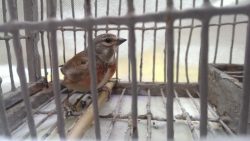BirdLife Malta welcomes the Opinion delivered this morning in Luxembourg by Eleanor V. E. Sharpston, Advocate General at the European Court of Justice (ECJ), in regard to the Infringement Proceedings initiated by the European Commission against Malta which resulted in the Maltese Government being taken to the European Court in October 2015 on the trapping of seven species of wild finches.
The recommendations by Advocate General Sharpston, now to be considered by the Court of Justice of the European Union which will deliver its final verdict later on this year, could spell another step towards the end of finch trapping in Malta.
In her Opinion conclusion, the Advocate General states that the Court should rule that by opening a trapping season for finches, the Republic of Malta has clearly failed to fulfil its obligations to abide with the Wild Birds Directive. She states that she is “entirely convinced that the present arrangements do not respect Malta’s obligations under EU law”.
In view of this freshly published AG’s Opinion following the court case of the European Commission against Malta in regard to the finch trapping derogation which follows a Letter of Formal Notice in October 2014 and a Reasoned Opinion issued in May 2015, BirdLife Malta is pleased to note that in all sections of the document, the Advocate General states that Malta’s finch trapping regulations were in breach of the Wild Birds Directive.
Whilst this document is presently being analysed, BirdLife Malta cannot but notice that the ECJ Advocate General has mentioned various facts that solidify the argument that it was a mistake to reopen finch trapping seasons since 2014. This, after finch trapping was phased out in 2009 as per Malta’s Accession Treaty to the EU.
At face value, it is clear that in her Opinion the Advocate General has turned down all of Malta’s arguments, amongst which those in relation to:
- ‘judicious use’;
- trapping as a ‘tradition’;
- the argument that there is ‘no other satisfactory solution’;
- the use of clap-nets as a medium of capture that can be derogated, and
- the fact that these type of nets are a method of capture that is both large-scale and non-selective.
The Advocate General also questions the capabilities of enforcement, and expresses serious doubts as to the credibility of the methodology used by Malta. She also expresses strong doubts that Malta can demonstrate that the populations of the seven species of finch can be maintained at a satisfactory level. To the contrary she states that it may even be that there is some risk that the use of clap-nets by 4,000 licence holders over a trapping season of 73 days may, potentially, be “capable of causing the local disappearance of a species”.
She is critical of the fact that instead of addressing any of the above-mentioned issues, Malta places emphasis on the fact that the use of such nets is ‘traditional’.
What is to BirdLife Malta’s satisfaction is the fact that the Advocate General’s Opinion is consistent with our repeated position that environmental laws, including the Wild Birds Directive, were enacted “to protect birds – not to regulate hunting or trapping them”; and also that “Member States do not have a carte blanche to derogate”. This AG Opinion also shows what BirdLife Malta has repeatedly suggested, that the Government was given the wrong advice by the hunting and trapping organisations.
Finally, the AG’s recommendations clearly go to show that political promises do not justify the adoption of a derogation. In view of this, BirdLife Malta reiterates its position taken during the latest Ornis Committee meeting that the Government should not accept the recommendation by Ornis to open this year’s trapping season before a final verdict is delivered by the ECJ later on this year.
Read the Opinion published this morning by the Advocate General of the European Court of Justice here. A Maltese version can be accessed here.
You can also read the Maltese version of our initial reaction here. To know more about the history of finch trapping in Malta click here.



